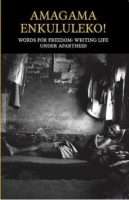‘Perhaps they want me to send a message to the children,’ he thought tenderly, noting that the clouds were drifting in the direction of his home some hundred miles away. But before he could frame the message, the warder in charge of his work span shouted:
‘Hey, what you tink you’re doing, Brille?’
The prisoner swung round, blinking rapidly, yet at the same time sizing up the enemy. He was a new warder, named Jacobus Stephanus Hannetjie. His eyes were the colour of the sky but they were frightening. A simple, primitive, brutal soul gazed out of them. The prisoner bent down quickly and a message was quietly passed down the line: ‘We’re in for trouble this time, comrades.’
‘Why?’ rippled back up the line.
‘Because he’s not human,’ the reply rippled down and yet only the crunching of the spades as they turned over the earth disturbed the stillness.
This particular work span was known as Span One. It was composed of ten men and they were all political prisoners. They were grouped together for convenience as it was one of the prison regulations that no black warder should be in charge of a political prisoner lest this prisoner convert him to their views. It never seemed to occur to the authorities that this very reasoning was the strength of Span One and a clue to the strange terror they aroused in the warders. As political prisoners they were unlike the other prisoners in the sense that they felt no guilt nor were they outcasts of society. All guilty men instinctively cower, which was why it was the kind of prison where men got knocked out cold with a blow at the back of the head from an iron bar. Up until the arrival of Warder Hannetjie, no warder had dared beat any member of Span One and no warder had lasted more than a week with them. The battle was entirely psychological. Span One was assertive and it was beyond the scope of white warders to handle assertive black men. Thus, Span One had got out of control. They were the best thieves and liars in the camp. They lived all day on raw cabbages. They chatted and smoked tobacco. And since they moved, thought, and acted as one, they had perfected every technique of group concealment.
Trouble began that very day between Span One and Warder Hannetjie. It was because of the shortsightedness of Brille. That was the nickname he was given in prison and is the Afrikaans word for someone who wears glasses. Brille could never judge the approach of the prison gates and on several previous occasions he had munched on cabbages and dropped them almost at the feet of the warder and all previous warders had overlooked this. Not so Warder Hannetjie.
‘Who dropped that cabbage?’ he thundered.
Brille stepped out of line.
‘I did,’ he said meekly.
‘All right,’ said Hannetjie. ‘The whole Span goes three meals off.’
‘But I told you I did it,’ Brille protested.
The blood rushed to Warder Hannetjie’s face.
‘Look ‘ere,’ he said. ‘I don’t take orders from a kaffir. I don’t know what kind of kaffir you tink you are. Why don’t you say Baas. I’m your Baas. Why don’t you say Baas, hey?’
Brille blinked his eyes rapidly but by contrast his voice was strangely calm.
‘I’m twenty years older than you,’ he said. It was the first thing that came to mind but the comrades seemed to think it a huge joke. A titter swept up the line. The next thing Warder Hannetjie whipped out a knobkerrie and gave Brille several blows about the head. What surprised his comrades was the speed with which Brille had removed his glasses or else they would have been smashed to pieces on the ground.
That evening in the cell Brille was very apologetic.
‘I’m sorry, comrades,’ he said: ‘I’ve put you into a hell of a mess.’
‘Never mind, brother,’ they said. ‘What happens to one of us happens to all.’
‘I’ll try to make up for it, comrades,’ he said. I’ll steal something so that you don’t go hungry.’


